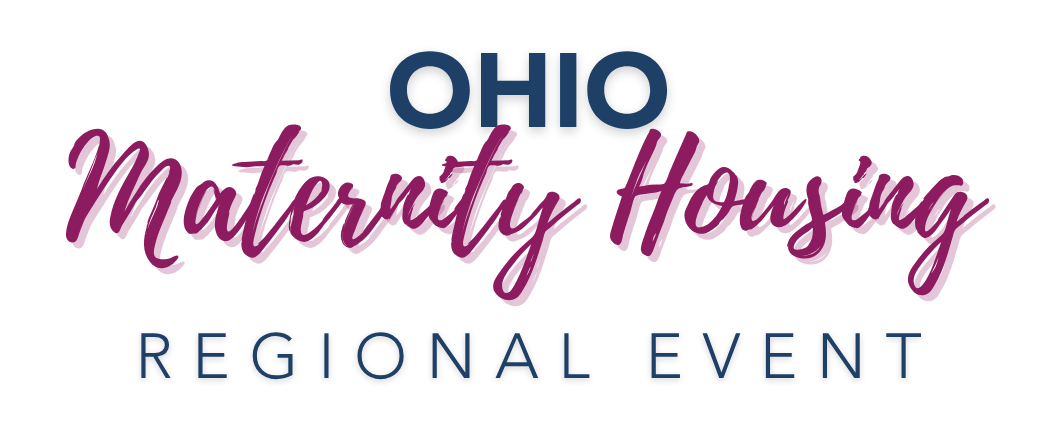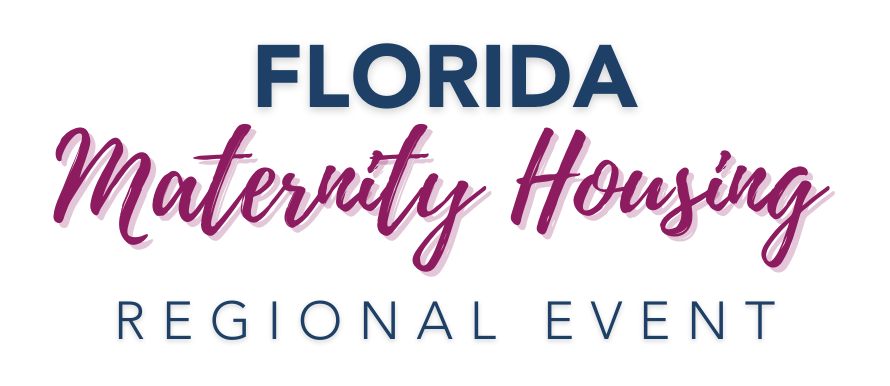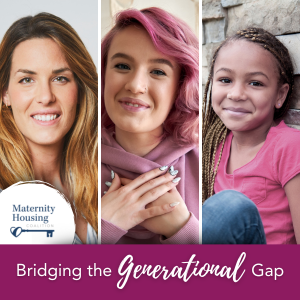Displaying items by tag: maternity housing
MHC Regional Event - VA


Co-hosted by MHC & Mary’s Choice RVA Maternity Home
Join us for our next regional event for maternity housing organizations!
WHERE
St. Michael Lake House
4491 Springfiled Rd.
Glen Allen, VA 23060
WHEN
Thursday, August 28, 2025
10 a.m. - 3 p.m.
Come at 9 a.m. for coffee and networking
Lunch provided.
MHC Regional Event - OH


Co-hosted by MHC & Hannah's Home
Join us for our next regional event for maternity housing organizations!
WHERE
Hannah’s Home
8525 Lakeshore Blvd #1516
Mentor, OH 44060
WHEN
July 21, 2025
10 a.m. - 3 p.m.
Come at 9 a.m. for coffee and networking
Lunch provided.
Parenting Through the Pain: Why Mothers with High ACE Scores Need Specialized Support
by Valerie Harkins, Executive Director of the Maternity Housing Coalition
For many single mothers in maternity housing, the road to healing is not only physical and practical but deeply emotional and spiritual. When a mother carries the weight of a high ACE (Adverse Childhood Experiences) score, she often brings a silent history of trauma that shapes how she parents.
As leaders in the maternity housing field, we must recognize this foundational truth:
You cannot give what you’ve never received.
This is especially true when it comes to emotional presence and nurturing love. For mothers who never experienced consistent affection, safety, or attuned care in childhood, offering those things to their baby can feel unnatural, overwhelming, or even impossible.
Why ACE Scores Matter in Parenting
The ACE study revealed a powerful connection between early childhood trauma and long-term outcomes in physical health, emotional well-being, and relational stability. A high ACE score often indicates exposure to abuse, neglect, addiction, mental illness, or violence in the home. These experiences rewire the brain and nervous system, making it difficult for someone to regulate emotions, feel safe in intimacy, or form secure attachments.
In parenting, this trauma can surface in subtle but significant ways. For instance, a mom may:
- avoid eye contact with her infant, feeling uncomfortable with the intimacy of being seen
- scroll on her phone for extended periods while her baby plays or cries nearby, using distraction to numb her own anxiety or dissociation
- leave the baby in the crib for excessive amounts of time, unsure how to interact or fearing that her presence won’t matter
- grow unresponsive to crying, not from neglectful intent, but because the sound triggers panic, shame, or helplessness
These behaviors are not signs of indifference; they are symptoms of deeper pain. They point to a mother doing the best she can with what she’s experienced—and often, that experience lacked nurture.
Parenting with an Insecure Attachment Style
Secure attachment develops when a caregiver consistently responds to a child’s needs with warmth, predictability, and attunement. But when a mother has an insecure attachment—whether avoidant, anxious, or disorganized—she may:
- Struggle to identify and respond to her child’s needs in real time.
- Feel emotionally flooded or numb in moments of closeness or distress.
- React to her baby’s crying with frustration, shutdown, or withdrawal.
- Feel uncomfortable offering affection, believing her presence may do more harm than good.
Attachment-based parenting isn’t about perfection—it’s about emotional presence. But for mothers with a high ACE score, presence itself can be terrifying.
This is where specialized support becomes critical.
What Is PCIT: Parent-Child Interaction Therapy?
One powerful, research-backed model that helps mothers break through emotional barriers is Parent-Child Interaction Therapy (PCIT). PCIT is a therapist-guided program where moms are coached in real-time while interacting with their child. It focuses on two major goals:
- Strengthening connection through praise, reflection, and engagement
- Improving discipline through consistent, calm, effective responses
Mothers often learn, sometimes for the first time, that they can be nurturing, present, and effective parents. They are praised for connecting, not just correcting—and that affirmation can be life-changing.
Practical Takeaways for Maternity Homes and Advocates
-
Prioritize Trauma-Informed Parenting Education
Equip staff, volunteers, and mentors to understand ACEs and how trauma may show up in parenting behaviors. Normalize the struggles without minimizing the importance of growth. -
Recommend Programs Like Mom Power
Mom Power is a 10-week, evidence-based group program that combines attachment-based parenting education, stress reduction, and peer support. It’s designed for trauma-impacted mothers and helps build a foundation of emotional safety—for both mom and child. -
Encourage Studying Attachment Styles
Help mothers learn about their own attachment style and how it impacts parenting. This self-awareness can open the door to compassion and change. -
Model Compassionate Curiosity
When a mother seems emotionally distant, disengaged from her infant, scrolling through her phone during feeding, or unmoved by her baby’s cry, assume discomfort, not apathy. Connection is often uncomfortable before it becomes healing. -
Remind Moms of God’s Healing Love
As Christian leaders, we believe no story is too broken for redemption. Remind mothers: “We love because He first loved us” (1 John 4:19).
The love of Christ is the model and source of our ability to offer love, even when it wasn’t modeled for us.
Parenting education for mothers with high ACE scores is not about fixing “bad behavior.” It’s about healing wounds that were never meant to be carried into motherhood. It’s about offering grace, not guilt, and equipping mothers to give what they are only just beginning to receive: emotional presence, secure love, and godly connection.
For more information on implementing trauma-informed parenting support in your maternity home or connecting with trusted program providers, This email address is being protected from spambots. You need JavaScript enabled to view it. to our team today.
______________________
Sources
https://www.cdc.gov/violenceprevention/aces/index.html
https://www.ajpmonline.org/article/s0749-3797(98)00017-8/pdf
MHC Regional Event - FL


Hosted by Thrive Southwest Florida
Join us for our second regional event for maternity housing organizations!
WHERE
Thrive Southwest Florida
907 SE 5th Ave, Cape Coral, FL 33990
WHEN
June 10, 2025
10 a.m. - 3 p.m.
Come at 9 a.m. for coffee and networking
Lunch provided.
From Silos to Strength: The Next Chapter for Maternity Homes
by Valerie Harkins, Executive Director of the Maternity Housing Coalition
I’ve noticed a subtle but powerful pattern after years of walking alongside maternity homes across the country: the organizations that tend to thrive—not just survive—are deeply connected to others who do the same kind of work.
In fact, the difference is striking. Homes that weather economic instability, staff transitions, and shifting cultural tides often have something in common: consistent, intentional relationships with other maternity homes. They are not isolated. They are known.
This may sound like a soft metric—connection, relationship, community—but in this work, it’s essential. Maternity housing is uniquely complex and deeply spiritual. It requires strength and tenderness, policies and prayer, grit and grace. Not every leader understands that tension, but another maternity home does.
When homes connect with one another, something shifts. A director no longer feels like she’s holding the whole world together on her own. A new staff member finds wisdom in someone else’s hard-won experience. A program director rethinks burnout because she saw someone else model the Sabbath well. These relationships aren’t just emotionally beneficial—they’re structurally stabilizing.
In short, being known by others in this work makes your home stronger.
The body of Christ is not meant to function in silos, and neither is our movement. God has designed us for interdependence—not only within our own teams, but across the entire network of homes and ministries around the world.
I truly believe the next chapter of strength for maternity housing will not come from any single home’s innovation, but from the shared wisdom of many homes, leaning in together. This is not a sentimental idea—it’s a strategy for survival, and more importantly, for flourishing.
If you’re looking for a place to start, I invite you to join our Affiliates-Only Facebook Group, where we foster authentic connection among homes like yours. It’s also where we share invites to our networking meetings throughout the year, which are gatherings that remind us we’re not alone, but understood, and part of something far greater than we could build by ourselves.
Let’s build that strength together.
Bridging the Generational Gap: Understanding Millennials, Gen Z, and Gen Alpha for Effective Maternity Housing Services
by Valerie Harkins, Executive Director of the Maternity Housing Coalition
As leaders and advocates in the maternity housing space, understanding the generational differences between Millennial, Gen Z, and Gen Alpha women is essential to providing responsive, compassionate, and effective care. Each generation has been shaped by unique societal forces, technology, and cultural movements. These factors influence how they view the world, identify themselves, engage with spirituality, and interact with support systems.
This article explores the defining traits of Millennials, Gen Z, and Gen Alpha, with a particular focus on how their differences impact the design and delivery of maternity housing programs. Most importantly, it offers research-backed strategies for adapting our programs to meet the needs of Gen Z women and mothers, who now make up the majority of women entering our homes.
Generational Snapshots: Who Are They?
Millennials (born approx. 1981–1996)
- Worldview: Shaped by 9/11, the 2008 recession, and the rise of the internet.
- Religion: Many Millennials identify as “spiritual but not religious.” Pew Research finds that 29% identify as religiously unaffiliated.
- Identity: Value authenticity, self-expression, and purpose-driven work.
- Experiences: Came of age with dial-up internet but adapted quickly to tech advancements.
- Behavior & Trends: Highly educated, skeptical of institutions, more likely to delay marriage and childbirth, and value social justice.
Gen Z (born approx. 1997–2012)
- Worldview: Defined by the internet age, social media, school shootings, climate anxiety, and COVID-19.
- Religion: The least religious generation to date; more likely to identify as agnostic, atheist, or spiritual-but-not-religious. Barna research shows that only 4% of Gen Z holds a biblical worldview.
- Identity: Embraces fluidity in identity—including gender and sexuality. Mental health, diversity, and inclusion are top priorities.
- Experiences: Digital natives. Socialized online. Often experienced isolation, especially during critical developmental years due to the pandemic.
- Behavior & Trends: Experience high levels of anxiety and depression; value transparency, inclusivity, and social activism. Less trusting of authority but very peer-influenced.
Gen Alpha (born approx. 2013–2025)
- Worldview: Still forming, but early data shows they will be the most technologically immersed generation. AI, climate change, and post-pandemic realities are shaping their upbringing.
- Religion/Identity: Still largely dependent on parental influence but projected to be even more secular and globally aware.
- Trends: Education and media are highly personalized. Influenced by short-form content (TikTok, YouTube Shorts), interactive tech, and values-based branding.
Implications for Maternity Housing: Gen Z vs. Millennials
While Millennials may still be present in our homes, Gen Z now makes up the majority of women entering maternity housing programs. This shift requires us to re-evaluate our approaches—from program structure to communication styles.
Key Differences That Affect Care
|
Area |
Millennial Moms |
Gen Z Moms |
|
Trust in Institutions |
Skeptical, but willing to engage |
Deeply distrustful, especially of authority figures |
|
Mental Health Needs |
Anxious, but open to therapy |
More severe and normalized mental health struggles; may rely on TikTok/peers for advice |
|
Faith/Spirituality |
May explore faith independently |
Unfamiliar with traditional faith language; skeptical of religion but open to spiritual experiences |
|
Community |
Seek authentic connection, but balance with independence |
Value online communities, but deeply crave in-person mentorship and peer validation |
|
Learning Style |
Prefer discussion, digital or live teaching |
Prefer short, visual, interactive, peer-approved content |
|
Communication Style |
Email/text preferred |
Texting, memes, DMs, and voice notes are more effective |
|
Parenting Expectations |
Emphasize gentle parenting, self-improvement |
Value child-centric approaches but may lack personal models of stable parenting |
Suggestions for Effective Programming for Gen Z Moms
1. Prioritize Mental Health & Trauma-Informed Care
Gen Z has been dubbed the “anxious generation.” According to the American Psychological Association, Gen Z is twice as likely as Millennials to report poor mental health.
What Works:
- Trauma-informed staff training
- On-site counseling and teletherapy options
- Wellness routines (journaling, mindfulness, peer support groups)
- Peer-led mental health education workshops
2. Revamp Spiritual Formation Models
Traditional Bible studies may not resonate. Gen Z is curious but deeply skeptical of religious institutions.
What Works:
- Story-based teaching rooted in personal experience
- Focus on spiritual conversations over religious instruction
- Emphasize identity, belonging, and purpose through a biblical lens
- Use visual storytelling, music, and creative expression
3. Design for Digital Natives
Gen Z learns and connects through screens. Programs must accommodate short attention spans and tech fluency.
What Works:
- Short, video-based lessons (think: 5–10 minute devotionals or parenting tips)
- QR codes linked to resources or testimonies
- Digital journaling or app-based self-reflection
- Instagram-style boards for visioning or goal-setting
4. Normalize Identity Conversations
Gen Z is navigating fluidity in gender, sexuality, and identity. While maternity housing may not affirm all ideologies, it must engage these women with grace and empathy.
What Works:
- Non-judgmental language in intake and interactions
- Emphasize God-given identity, value, and dignity
- Use peer mentors who model integrity and compassion
- Create space for questions and honest conversations
5. Offer Customizable Life Skills Tracks
Gen Z expects personalization. One-size-fits-all programming often leads to disengagement.
What Works:
- Modular curriculum based on goals (e.g., employment, education, parenting)
- Self-paced learning options
- Incentive-based engagement (e.g., digital badges, milestone rewards)
6. Center Peer Influence and Mentorship
Gen Z relies heavily on peer feedback and social proof. Programs should foster authentic community and peer leadership.
What Works:
- Peer-led support groups or house meetings
- Older Gen Z or Millennial alumni mentors
- Testimony-sharing and story circles
- Collaborative goal-setting and accountability partners
Looking Ahead: Preparing for Gen Alpha
While Gen Alpha moms are not in our homes yet, their formative years are underway. They will expect hyper-personalized, on-demand, emotionally intelligent environments. Programs that begin adapting today—leaning into tech, emotional literacy, and spiritual resilience—will be best positioned to serve tomorrow’s mothers.
Gen Z mothers bring unique challenges and profound opportunities. They are bold, curious, digitally native, and fiercely values-driven. To serve them well, maternity housing leaders must reimagine programming that is trauma-informed, spiritually engaging, tech-forward, and relationally rich. By doing so, we not only meet their immediate needs—we shape a generation of resilient, faith-rooted, and empowered mothers.
____________________________________________
Sources
- Pew Research Center (2019). Defining generations: Where Millennials end and Gen Z begins.
https://www.pewresearch.org - McCrindle Research (2020). Generation Alpha Report.
https://mccrindle.com.au - Barna Group (2021). The Open Generation: How Teens Around the World View God, Scripture, and the Church.
https://www.barna.com - Pew Research Center (2021). About three-in-ten U.S. adults are now religiously unaffiliated.
https://www.pewresearch.org/fact-tank/2021/12/14/about-three-in-ten-u-s-adults-are-now-religiously-unaffiliated/ - American Worldview Inventory (2023). Only 4% of Gen Z Hold a Biblical Worldview. Cultural Research Center, Arizona Christian University.
https://www.arizonachristian.edu - American Psychological Association (2018–2023). Stress in America Survey.
https://www.apa.org/news/press/releases/stress - McKinsey & Company (2021). True Gen: Generation Z and its implications for companies.
https://www.mckinsey.com - Deloitte (2023). Global Gen Z and Millennial Survey.
https://www2.deloitte.com - Pew Research Center (2022). Teens, Social Media and Technology 2022.
https://www.pewresearch.org/internet/2022/08/10/teens-social-media-and-technology-2022/ - Common Sense Media (2023). The State of Mental Health in U.S. Teens.
https://www.commonsensemedia.org - Barna Group (2022). How the Next Generation Engages with Faith.
https://www.barna.com/research/gen-z-engagement/ - Education Week (2021). Teaching Gen Z: What Educators Need to Know About Today’s Students.
https://www.edweek.org
Maternity Minute


Episode 1
Simplifying Your Maternity Home’s Rules
by Valerie Harkins, Executive Director of the Maternity Housing Coalition
Running a Christian maternity home is a sacred calling—one that requires wisdom, discernment, and an ever-present commitment to the well-being of the women we serve. However, the complexity of house rules and resident handbooks can sometimes hinder rather than help. As leaders, it is essential to periodically review and simplify our guidelines to ensure they align with our mission, support trauma-informed care, and create a healthier environment for both residents and staff.
The Benefits of Fewer, More Impactful Rules
Maternity homes often accumulate an extensive list of rules over time, each intended to address specific behaviors or concerns. While structure is necessary, an overabundance of rules can create confusion, resistance, and an atmosphere of legalism rather than transformation. Research in trauma-informed care suggests that individuals who have experienced significant hardship—such as those in crisis pregnancies—respond better to environments that prioritize clarity, consistency, and emotional safety over rigid control (SAMHSA, 2014).
Here’s why fewer, well-enforced rules lead to better outcomes:
- Increased Adherence – Too many rules can overwhelm residents, leading them to disengage. Trauma-impacted individuals often struggle with authority due to past experiences; simple, clear expectations increase the likelihood of compliance (Bloom, 2010).
- Enhanced Mission Alignment – Every rule should directly reflect your home’s mission. If a rule does not serve a clear and meaningful purpose, it may be more of a hindrance than a help.
- Reduced Staff Burnout – Staff members are tasked with enforcing policies, and an overly complex rulebook increases their workload and stress. Simplified guidelines free them to focus on relationship-building and discipleship rather than constant policing.
- Greater Resident Growth – A structured yet flexible environment allows residents to make meaningful choices, take personal responsibility, and develop life skills that will serve them beyond their time in your home.
Begin reviewing and simplifying your guidelines in four easy steps.
1. Evaluate Your Current Rules
A practical first step is to review each rule through the lens of your mission and impact. Ask:
- Does this rule directly support our core values?
- Is it necessary for safety, order, or spiritual growth?
- Is it enforceable in a fair and consistent way?
- Does it encourage autonomy and personal responsibility?
- Is it communicated clearly and simply?
Rules that do not meet these criteria may need to be revised or eliminated. This review should also include staff and, when appropriate, resident feedback to ensure rules are realistic and effective.
2. Review Your Rules' Biblical Foundation for Clarity and Integrity
Scripture speaks to the importance of simple, truthful, and consistent communication. Jesus instructs in Matthew 5:37, “Let your ‘Yes’ be ‘Yes,’ and your ‘No,’ ‘No.’ For whatever is more than these is from the evil one.” A maternity home should be a place where both residents and staff trust that expectations are clear and that enforcement is fair. If rules are too numerous or inconsistently applied, trust erodes, leading to unnecessary conflict and stress.
Additionally, Colossians 3:21 warns, “Fathers, do not embitter your children, or they will become discouraged.” While maternity home residents are not children, the principle remains: an environment with excessive, unclear, or inconsistently enforced rules can breed discouragement rather than growth.
3. Embrace the Role of Trauma-Informed Care
Trauma-informed care acknowledges that many maternity home residents have experienced significant emotional, physical, or spiritual wounds. A punitive, rigid structure often reinforces their past experiences of instability and rejection. Instead, clear and meaningful rules...
- promote predictability, which is crucial for emotional safety
- encourage respectful dialogue, rather than a power struggle
- allow natural consequences to shape growth instead of unnecessary punitive measures
By embracing a trauma-informed approach, maternity homes create an environment where healing is prioritized over control, ultimately leading to better long-term outcomes for residents.
4. Implement Thoughtful and Clear Communication
Once rules are streamlined, they must be communicated effectively. Consider implementing the following:
- A concise handbook that explains each rule’s purpose
- Regular orientation sessions to reinforce understanding
- A consistent enforcement approach so that residents know what to expect
- Opportunities for open discussion that allow residents to ask questions and seek clarification without fear
___________________________________________________________________________
1. SAMHSA’s Concept of Trauma and Guidance for a Trauma-Informed Approach | SAMHSA Publications and Digital Products. (2014, October). Samhsa.gov. https://library.samhsa.gov/product/samhsas-concept-trauma-and-guidance-trauma-informed-approach/sma14-4884
2. Bloom, S. (2010). Organizational Stress as a Barrier to Trauma-Informed Service Delivery. Springer. https://connectingparadigms.org/wp-content/uploads/2019/05/21360-Organizational_Stress_as_a_Barrier_to_Trauma-Informed-Bloom.pdf
MHC Regional Event - MO


Hosted by St. Raymond's Society (SRS)
Join us for our first regional event for maternity housing organizations!
WHERE
St. Raymond's Society Event Center
300 Portland, Columbia, MO 65201
WHEN
March 25, 2025
10 a.m. - 3 p.m.
Come at 9 a.m. for coffee and networking
Lunch provided.
Empowering and Protecting Resident Voices: Resident Feedback
by Valerie Harkins, Executive Director of the Maternity Housing Coalition
In maternity housing, providing a safe and nurturing environment goes hand-in-hand with giving residents a voice. Honoring each woman’s dignity requires valuing her unique perspective and ensuring she feels heard. After all, the mission of a maternity home is to serve residents—not the other way around. This foundational commitment, established at incorporation and upheld for donors and constituents alike, keeps the organization focused on its true purpose: service through ministry to residents.
Structured resident surveys can be instrumental in fostering this environment. Anonymous surveys with open-ended questions allow residents to express their thoughts freely, supporting both transparency and safety. However, concerns inevitably arise: "What if residents lie or don’t tell the full story?" or "What if they manipulate responses to create triangulation?" Acknowledging these realities—along with the possibility that staff voices might go unheard—does not diminish the value of feedback. In fact, it strengthens it by promoting checks and balances between residents and staff. The survey process itself, done with integrity, serves as an accountability measure that protects both parties.
Beyond immediate insights, surveys reveal trends over time. While one resident’s perspective may be unique, repeated themes across surveys highlight patterns that can guide program adjustments. Additionally, survey data provides essential outcome measurements, serving as a valuable tool for evaluating program efficacy and reporting to donors, board members, and staff.
Example survey questions that invite honest reflection include:
-
"What has your experience in the home been like this month?
-
“What helped you?”
-
“What did not help you?”
-
“Did you feel safe this month? Why or why not?”
-
“Is there anything on your mind that you’d like us to know that you might not feel comfortable sharing in person?”
-
“What has your spiritual experience been like this month?”
-
“Did you learn anything new this month? If so, what did you learn?”
-
“What do you feel you need most right now?”
-
“How was your sobriety journey this month?”
-
“How many close friends do you have right now?”
-
“What are your goals for the future?”
-
"What do you feel you need most right now?"
Through structured feedback, maternity homes can fulfill their mission of dignified service, ensuring the organization remains a sanctuary of support, integrity, and growth.

